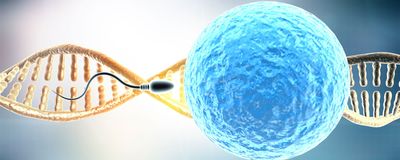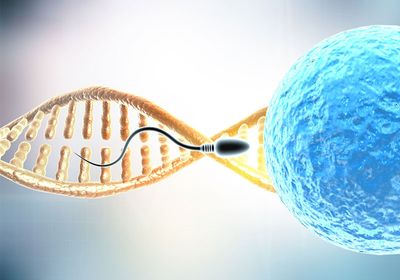ABOVE: Preconception, epigenetic changes in sperm can influence offspring metabolic health. ©istock, Rasi Bhadramani
Many mysteries surround if and how both parents’ lifestyles before conception can influence their children’s health. Previous studies on metabolic conditions, like type 2 diabetes, have hinted that paternal diet and sperm-derived small RNA influence disease susceptibility in offspring, but the mechanisms remain unclear.1,2 “The vast majority of these kinds of complex diseases suffer from missing heritability; there's a predicted genetic predisposition which doesn't really match the observed heritability,” said Raffaele Teperino, a physiologist and pharmacologist at the Helmholtz Munich, who investigates metabolic disease susceptibility. “There must be a huge component of the pathogenesis which is not simply explained by genetic predisposition.”
Teperino explores pathways of sperm-borne epigenetic inheritance to fill in the knowledge gaps between genetic predisposition and actual metabolic disease heritability. In their latest work published in Nature, he and his research team examined the effects of paternal diet on sperm transcriptomes and offspring metabolism in mice and humans.3 They found that mature epididymal spermatozoa, but not developing germ cells, are sensitive to dietary-induced mitochondrial tRNA (mt-tRNA) changes, and revealed that sperm mt-tRNA are epigenetic regulators that influence offspring metabolism. The research team also uncovered similar connections between high paternal weight and sperm RNA changes in humans.
Sperm harbor a complex and environment-sensitive pool of small non-coding RNAs (sncRNA), including mt-tRNA and their fragments (mt-tsRNA). In 2019, a small study in humans showed that exposure to an acute high sugar diet rapidly increased mt-tsRNA in sperm, which gave Teperino a hint to look at these RNA species as first responders to metabolic stress.1 He and his team administered a short term high fat diet to mice before profiling sperm RNA expression changes and investigating offspring health. They found that the acute high fat diet induced mitochondrial dysfunction in male mice, which impaired glucose tolerance and homeostasis in male offspring that were fed normally.
“I was interested in, ‘what’s the mechanism? How does all this happen?’” said Upasna Sharma, a developmental biologist at University of California, Santa Cruz, who investigates transgenerational inheritance and environmental stress effects on gamete epigenomes, and who was not involved in this study. “Here they show that it's the mitochondrial stress or dysfunction which is changing the small RNA in sperm, and that could then potentially affect the next generation and the phenotype. I think that was an interesting connection.”
Teperino and his team also demonstrated sperm-to-oocyte transfer of nongenetic material for the first time, observing mt-tRNA and epigenetic regulation in early embryos through single embryo transcriptomics using hybrid two-cell embryos from genetically distinct maternal and paternal mouse strains. “Using those two different genetic background strains, they were able to show that sperm mitochondrial tRNA are being delivered to the oocyte at fertilization, which further solidifies the model that we currently have, that it is sperm small RNA that change in response to environment,” said Sharma. “They’re delivered to the embryo and maybe change early embryonic gene expression and development, which then results in the altered phenotypes.”
A missing piece in the puzzle was connecting these mouse mechanisms to humans. Teperino and his team profiled spermatozoa sncRNA from young, healthy Finnish volunteers who were metabolically phenotyped and stratified by body mass index (BMI) and fat mass. They found that mt-tRNA were the only type of small RNA positively associated with BMI. In a separate human dataset, the researchers also identified a connection between high paternal weight at conception and compromised offspring metabolic health.
This study supports the contributions of paternal lifestyle on offspring metabolic health, shows that mt-tRNA are diet-induced and sperm-borne epigenetic regulators, and demonstrates father-to-offspring transfer of nongenetic information at fertilization. Teperino’s team also observed that sperm sncRNA levels and offspring glucose tolerance were comparable between low fat and high fat diet-fed mice after they returned to a normal chow diet, underscoring the importance of this modifiable mechanism. “This is a fully reversible mechanism that actually leaves hope, in a way, that if we correct paternal lifestyle before conception, then we can correct offspring phenotypes,” Teperino said. “We've uncovered an additional risk factor, but this is a risk factor, not a deterministic factor.”
- Nätt D, et al. Human sperm displays rapid responses to diet. PLoS Biol. 2019;17(12):e3000559.
- Sharma U. Paternal contributions to offspring health: Role of sperm small RNAs in intergenerational transmission of epigenetic information. Front Cell Dev Biol. 2019;7:215.
- Tomar A, et al. Epigenetic inheritance of diet-induced and sperm-borne mitochondrial RNAs. Nature. 2024;630:720-727.




